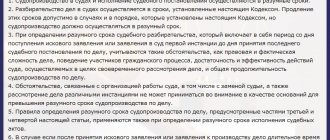Commentary to Art. 45 Criminal Code
1. The main types of punishments can be imposed by the court only as independent ones and cannot be added to other punishments. This or that main type of punishment can be imposed by the court only if it is directly enshrined in the sanction of the applicable article of the Special Part of the Criminal Code. An exception to this rule is Art. 64 of the Criminal Code, according to which, in the presence of exceptional mitigating circumstances, the court may impose a more lenient punishment than provided for the crime.
2. Additional types of punishment cannot be imposed by the court independently; they are added to the main punishment, thus increasing the scope of legal restrictions. The court may deprive a person of a special, military or honorary title, class rank and state awards if there is such a need for a serious or especially serious crime.
Everything about criminal cases
When additional punishment is not necessaryYou can identify such an article by the phrase “ or without
".
An example of such an article: 228.1 of the Criminal Code
. If you look at the sanction of this article, you will see this phrase there.
This means that the court has the right (but not the obligation) to impose or not to impose an additional punishment.
(Note: if the sanction does not mention the article on additional punishment at all, then the court cannot impose any additional punishment).
Additional motivation punishments
For those articles where additional punishment is NOT mandatory, the court is obliged
motivate - why he appoints him.
Url Additional information:
- Part 4 307 Code of Criminal Procedure
motivation for punishment in the reasoning part of the sentence
«the reasoning part of the guilty verdict must contain the reasons for resolving all issues related to the imposition of criminal punishment
» (
Part 4 307 Code of Criminal Procedure
).
Url Additional information:
- paragraph 59
Plenum No. 58 additional punishment - requires motivation
«When imposing punishment under articles of the criminal law that provide for the possibility of applying additional punishments at the discretion of the court, the verdict should indicate the grounds for their application with relevant motives.
"(
clause 59
of Plenum No. 58).
ILLUSTRATION 1
Determination of the First Court of Cassation No. 77-597/2021.
«In accordance with the explanations contained in paragraph 59 of the Resolution of the Plenum of the Supreme Court of December 22, 2015 No. 58 “On the practice of imposing criminal punishment by courts”, when imposing punishment under articles of the criminal law that provide for the possibility of applying additional punishment at the discretion of the court, the sentence should indicate reasons for their use, citing relevant motives
.
Meanwhile, the descriptive and motivational part of the verdict, contrary to the requirements of the law, does not contain conclusions
on the need to impose additional punishment on the convicted person in the form of restriction of freedom.
Based on the above: exclude from the operative part of the sentence the indication of imposing an additional punishment in the form of restriction of freedom ."
ILLUSTRATION 2
Determination of the First Court of Cassation No. 77-1440/2020.
“ In accordance with
Part 3 of 46 of the Criminal Code, to determine the amount of the fine, it is necessary to find out whether the convicted person has a place of work, the amount of his salary or other income, the possibility of employment, the presence of property, and dependents.
The court ignored the above requirements .”
The court's mistake in this case was that it simply imposed a fine without examining the possibility of paying it.
The interesting thing is that:
— the cassation completely removed the fine, that is, it did not reduce it, but completely excluded it from the verdict;
- in this case the argument of lack of motivation
the imposition of a fine served as a “starter” at the stage of the complaint to the Chairman of the Supreme Court (we also call it the third stage of cassation). The Chairman of the Supreme Court canceled the decision of the Supreme Court judge to refuse to transfer the complaint for consideration + transferred the case for consideration to the district cassation court.
(Note: you can find materials on the “starter” method here: “ Starter
» - searching for an argument for the judge to request a case.
You can read about the specifics of filing complaints to the Chairman of the Supreme Court here: Complaint to the Chairman of the Supreme Court
, selection of materials).
Second commentary to Art. 45 of the Criminal Code of the Russian Federation
1. According to the order of application, all types of punishment are divided into: a) main, b) additional, c) punishments with a dual legal nature (assigned both as main and as additional).
2. The types of punishments listed in part 1 of this article are the main ones. They bear this name because they are assigned only independently and cannot be combined with other types of punishment. Due to their nature and content, it is they who are called upon to provide the main, main, defining task of achieving the goals facing punishment.
3. A fine, deprivation of the right to hold certain positions or engage in certain activities, as well as restriction of freedom are punishments with a dual legal nature: they can be applied both as primary and as additional (Part 3 of the article). Guided by certain rules, the court can vary the application of these types of punishment, assigning them as either only basic or only additional.
4. Part 3 of this article provides for additional punishment. It is assigned only by joining the main ones and cannot be used as an independent punishment. This punishment plays an auxiliary, secondary role in achieving the goals facing the punishment.
Basic and additional types of punishments
All types of punishment according to the order of their application are classified into three groups: 1) basic; 2) additional and 3) punishments with a dual legal nature, i.e. used as both basic and additional.
The main types of punishment are those that are assigned only independently and cannot be combined with other types of punishment. These include compulsory labor, correctional labor, restrictions on military service, arrest, detention in a disciplinary military unit, imprisonment for a certain period, life imprisonment and the death penalty. They can be appointed by the court only when they are directly provided for by the sanction of the applicable article of the Special Part of the Criminal Code. However, with an extreme mitigation of punishment in accordance with Art. 64 of the Criminal Code, the court has the right to impose a more lenient type of punishment not provided for by the sanction than is listed in the sanction. The same right belongs to the court when replacing the unserved part of the punishment with a milder type of punishment (Part 3 of Article 80 of the Criminal Code).
For a single crime, only one primary punishment can be imposed. But in the case of a totality of crimes and a totality of sentences, the main punishment, which is urgent in nature and associated with corrective labor on the convicted person, can be combined with a fine or deprivation of the right to hold certain positions or engage in certain activities assigned as the main punishment (Part 2 of Art. 71 CC).
An additional type of punishment is only deprivation of a special, military or honorary title, class rank and state awards. It cannot be applied independently, but is only added to other (main) types of punishment imposed by the court for grave and especially grave crimes, if, taking into account the personality of the perpetrator, the court finds it impossible to retain the specified titles, ranks or awards for him.
A fine and deprivation of the right to hold certain positions or engage in certain activities and restriction of freedom are types of punishment with a dual legal nature: they are applicable both as basic and as additional.
A fine and restriction of freedom as additional types of punishment can be imposed by the court only in cases where they are provided for by the sanction of the applicable article of the Special Part of the Criminal Code.
Deprivation of the right to hold certain positions or engage in certain activities as the main punishment is imposed in cases where it is provided for by a sanction, as well as when a more lenient punishment is imposed than provided for the crime committed (Article 64 of the Criminal Code). And as an additional punishment, it can be imposed even when it is not provided for by the sanction of the corresponding norm of the Special Part of the Criminal Code, but the court, taking into account the nature and degree of public danger of the crime committed, as well as the identity of the perpetrator, recognizes it as inappropriate to retain his right to hold a certain position or engage in certain activities.
It is necessary to distinguish between sanctions in which additional punishment is provided as mandatory, and sanctions in which it is provided as optional. “If the law under which the crime committed is qualified provides for the mandatory imposition of an additional punishment (for example, part one of Article 290 of the Criminal Code of the Russian Federation), then its non-application by the court is allowed only if the conditions provided for in Article 64 of the Criminal Code of the Russian Federation are met, and must be motivated in the sentence with reference to the specified article" (clause 39 of the Resolution of the Plenum of the Supreme Court of the Russian Federation of January 11, 2007 N 2 "On the practice of imposing criminal punishment by the courts of the Russian Federation").
If the law provides for the imposition of an additional punishment optionally, then the court has the right to assign it (or not to assign it), motivating its decision in the verdict.
All types of punishment according to the order of their application are classified into three groups: 1) basic; 2) additional and 3) punishments with a dual legal nature, i.e. used as both basic and additional.
The main types of punishment are those that are assigned only independently and cannot be combined with other types of punishment. These include compulsory labor, correctional labor, restrictions on military service, arrest, detention in a disciplinary military unit, imprisonment for a certain period, life imprisonment and the death penalty. They can be appointed by the court only when they are directly provided for by the sanction of the applicable article of the Special Part of the Criminal Code. However, with an extreme mitigation of punishment in accordance with Art. 64 of the Criminal Code, the court has the right to impose a more lenient type of punishment not provided for by the sanction than is listed in the sanction. The same right belongs to the court when replacing the unserved part of the punishment with a milder type of punishment (Part 3 of Article 80 of the Criminal Code).
For a single crime, only one primary punishment can be imposed. But in the case of a totality of crimes and a totality of sentences, the main punishment, which is urgent in nature and associated with corrective labor on the convicted person, can be combined with a fine or deprivation of the right to hold certain positions or engage in certain activities assigned as the main punishment (Part 2 of Art. 71 CC).
An additional type of punishment is only deprivation of a special, military or honorary title, class rank and state awards. It cannot be applied independently, but is only added to other (main) types of punishment imposed by the court for grave and especially grave crimes, if, taking into account the personality of the perpetrator, the court finds it impossible to retain the specified titles, ranks or awards for him.
A fine and deprivation of the right to hold certain positions or engage in certain activities and restriction of freedom are types of punishment with a dual legal nature: they are applicable both as basic and as additional.
A fine and restriction of freedom as additional types of punishment can be imposed by the court only in cases where they are provided for by the sanction of the applicable article of the Special Part of the Criminal Code.
Deprivation of the right to hold certain positions or engage in certain activities as the main punishment is imposed in cases where it is provided for by a sanction, as well as when a more lenient punishment is imposed than provided for the crime committed (Article 64 of the Criminal Code). And as an additional punishment, it can be imposed even when it is not provided for by the sanction of the corresponding norm of the Special Part of the Criminal Code, but the court, taking into account the nature and degree of public danger of the crime committed, as well as the identity of the perpetrator, recognizes it as inappropriate to retain his right to hold a certain position or engage in certain activities.
It is necessary to distinguish between sanctions in which additional punishment is provided as mandatory, and sanctions in which it is provided as optional. “If the law under which the crime committed is qualified provides for the mandatory imposition of an additional punishment (for example, part one of Article 290 of the Criminal Code of the Russian Federation), then its non-application by the court is allowed only if the conditions provided for in Article 64 of the Criminal Code of the Russian Federation are met, and must be motivated in the sentence with reference to the specified article" (clause 39 of the Resolution of the Plenum of the Supreme Court of the Russian Federation of January 11, 2007 N 2 "On the practice of imposing criminal punishment by the courts of the Russian Federation").
If the law provides for the imposition of an additional punishment optionally, then the court has the right to assign it (or not to assign it), motivating its decision in the verdict.
Third commentary to Article 45 of the Criminal Code of the Russian Federation
1. The criminal law divides punishments into basic and additional. The main punishments are those that can only be assigned independently; they cannot be added in addition to other types of punishment, and they are mainly associated with the fulfillment of the goals of punishment. Two main punishments cannot be imposed for committing one crime. Additional penalties are measures that are auxiliary in nature to ensure the goals of punishment. They cannot be appointed independently; they are only attached to the main ones. They are designed to individualize punishment as much as possible, enhance its educational effect and ultimately ensure the achievement of the goals of punishment. Exclusively as an additional punishment, only deprivation of a special, military or honorary title, class rank and state awards can be applied, but taking into account the conditions specified in Art. 48 of the Criminal Code. In the sanctions of the norms of the Special Part of the Criminal Code, there is no indication of this type of punishment.
2. In the sanctions of some articles of the Special Part of the Criminal Code, additional punishments act both as mandatory (for example, Part 1 of Article 187 of the Criminal Code) and as optional (Part 2 of Article 187 of the Criminal Code), the application of which depends on the decision of the court, and in each case, the reasons for their appointment are specified by the court in the verdict. An additional punishment cannot be more severe than the main one, nor can it have the same corrective properties as the main one (for example, deprivation of the right to engage in a certain activity in addition to deprivation of the right to hold a certain position).
If the law under which the crime committed is classified provides for the mandatory imposition of an additional punishment (for example, part one of Article 290 of the Criminal Code), then its non-application by the court is allowed only if the conditions provided for in Article 64 of the Criminal Code are met, and must be motivated in the sentence with reference to this article .
As the Plenum of the Supreme Court of the Russian Federation explained in Resolution No. 20 of October 29, 2009 “On some issues of judicial practice in the appointment and execution of criminal punishment”, when deciding to impose an additional punishment, the court in the operative part of the sentence must indicate an article of the General Part of the Criminal Code, providing for the conditions and procedure application of this type of punishment (clause 15).
3. Criminal penalties that are applied both as basic and as additional to the main one are considered to be mixed.
There are three of them: a fine, deprivation of the right to hold certain positions or engage in certain activities, and restriction of freedom. Such punishments can be imposed as basic (for example, Art. 170, 176 of the Criminal Code) and as additional (for example, Art. 264 of the Criminal Code). ‹ Article 44. Types of punishmentUp Article 46. Fine ›
Assignment of punishment
The main form of implementation of criminal liability is criminal punishment
- a measure of state coercion imposed by a court verdict on a person found guilty of committing a crime.
In essence, punishment is punishment, retribution by the state for what it has done. Punishment pursues the following goals
: 1) restoration of social justice; 2) correction of the convicted person; 3) preventing the commission of new crimes.
The current Criminal Code of the Russian Federation includes 12 types of punishments, which are divided into three groups:
- basic (applied independently - punishments 4, 5, 6, 7, 8, 9, 10, 11 and 12 from the list below);
- additional (used only in combination with the main ones - 3);
- punishments applied both as main and additional ones (1 and 2).
Types of punishments:
1. Fine
– a monetary penalty in the amount of two thousand five hundred to one million rubles or in the amount of wages or other income of the convicted person for a period of two weeks to five years. When determining the amount of the fine, the severity of the crime, the financial status of the convicted person and his family, as well as the possibility of the convicted person receiving wages are taken into account. The court may impose a fine with payment in installments for up to three years. In case of malicious evasion of payment of a fine, it is replaced by compulsory labor, correctional labor or arrest. The possibilities for applying a fine in the Criminal Code of the Russian Federation are quite extensive. This type of punishment is provided for and sanctioned by almost every third norm of the Criminal Code.
2. Deprivation of the right to hold certain positions or engage in certain activities
– consists of prohibiting the convicted person from holding positions in the civil service, in local government bodies, or from engaging in certain professional or other activities (medical, pedagogical, in the field of trade and public services, etc.). As a main one, this type of punishment can be imposed for a period of from one year to five years, and as an additional one - for a period of six months to three years.
3. Deprivation of a special, military or honorary title, class rank or state awards
- can only be imposed as an additional punishment for serious or especially serious crimes and is mainly associated with the moral impact on the convicted person. Special ranks exist in the Ministry of Internal Affairs, the penal system, and the customs service. Military ranks are established by the Federal Law “On Military Duty and Military Service”. Class ranks are assigned to state civil servants, prosecutors, and bailiffs.
4. Mandatory work
- a type of punishment previously unknown to our legislation, consists of the convicted person performing free community service during his free time from work or study. The type of work and the facilities at which they are performed are determined by local government bodies in agreement with the penal inspections (as a rule, these are works on the improvement of a populated area that do not require special skills and knowledge). The duration of compulsory labor is set in the range from 60 to 240 hours, and they are served no more than four hours a day; in case of malicious evasion, they are replaced by restriction of freedom, arrest, or even imprisonment (one day for eight hours of compulsory labor).
Mandatory work cannot be assigned:
- disabled people of the first group;
— pregnant women and women with children under three years of age;
- military personnel undergoing military service upon conscription, as well as under contract in the positions of privates and sergeants.
5. Correctional work
- are assigned to a convicted person who does not have a main place of work, and consist of deducting from his earnings to the state income from five to twenty percent. The duration of this punishment ranges from two months to two years. In case of malicious evasion from correctional labor, it is provided for its replacement with more severe types of punishment. This type of punishment cannot be assigned to the same circle of persons who are not assigned compulsory labor.
6. Restriction on military service
- is a new type of punishment, similar in content to correctional labor. Applies to convicted military personnel undergoing military service under a contract for a period of two months to three years for crimes against military service. Deductions are made from the convict's monetary allowance to the state in an amount not exceeding 20%. In addition, while serving a sentence, a convicted person cannot be promoted to military rank or position, and the term of punishment is not counted towards the length of service (for the assignment of the next military rank).
7. Restriction of freedom
– is also a new type of punishment, the application of which in Russia does not have sufficient experience. It consists of keeping a convicted person, who has reached the age of 18 at the time of the court’s sentencing, in a special institution without isolation from society under conditions of supervision over him. Restriction of freedom is imposed: a) for those convicted without a criminal record for intentional crimes - for a period of one to three years; b) convicted for crimes committed through negligence - for a term of one to five years. In case of malicious evasion from serving this punishment, it is replaced by imprisonment. Restriction of freedom cannot be assigned to: disabled people of the first and second groups; pregnant women and women with children under 14 years of age; women and men who have reached the general retirement age; military personnel undergoing military service upon conscription.
8. Arrest
- another new type of punishment, its essence consists in keeping the convicted person in conditions of strict isolation from society for a period of one to six months. Punishment in the form of arrest must be served in special arrest houses, the conditions in which are similar to prison ones. Arrest is not imposed on persons under 16 years of age at the time of sentencing, as well as pregnant women and women with children under 14 years of age.
9. Confinement in a disciplinary military unit
– appointed to military personnel undergoing military service by conscription, as well as under contract in the positions of privates and sergeants for a period of two months to three years for crimes against military service. Thus, the convicted person does not cease to be a military serviceman - he continues to perform military service, but under specific conditions. In this case, the period of serving the sentence is not counted towards the period of active service.
10. Imprisonment for a specified period
– consists of isolating the convicted person from society by sending him to:
— colony-settlement;
— a correctional colony of general, strict or special regime;
- prison.
Minors (under 18 years of age at the time of the court's verdict) serve imprisonment in educational colonies.
Imprisonment can be imposed for a period from two months to twenty years. In the case of partial or complete addition of terms of imprisonment when imposing sentences for an aggregate of crimes, the maximum term of imprisonment cannot exceed 25 years, and for an aggregate of sentences - 30 years.
11. Life imprisonment
– performs a purely preventive function. Established for the commission of especially serious crimes encroaching on life and public safety. Based on considerations of humanity, the criminal law excludes the imposition of this punishment on women; persons who committed a crime under the age of 18; men who have reached 65 years of age at the time of sentencing.
Convicts serve this type of punishment in special regime colonies. They may be released from further serving their sentence in accordance with acts of amnesty or pardon or on parole, subject to the actual serving of at least 25 years of imprisonment.
12. The death penalty
- is one of the oldest punishments in criminal law; it was known both to pre-revolutionary and Soviet post-revolutionary criminal legislation. In modern conditions, many countries have either completely excluded the death penalty from their legislation or abandoned its actual application. According to the Criminal Code of the Russian Federation, the death penalty is an exceptional measure of punishment and can be imposed only for particularly serious crimes that encroach on life. These include: murder under aggravating circumstances (Part 2 of Article 105), encroachment on the life of a statesman (Article 277), encroachment on the life of a person conducting justice or preliminary investigation (Article 295), encroachment on the life of a law enforcement officer (Article 317) , genocide (Article 357). The death penalty is not imposed on the same persons who are not subject to life imprisonment. Since 1996, Russia has had a moratorium on the execution of sentences carrying the death penalty, and since 1999 no sentences carrying the death penalty have been passed.
When assigning punishment, the following are taken into account:
— the nature and social danger of the crime;
— the identity of the culprit;
— circumstances mitigating or aggravating punishment;
- the impact of the imposed punishment on the correction of the convicted person and on the living conditions of his family.
To extenuating circumstances
include (Article 61 of the Criminal Code of the Russian Federation):
- minor age of the perpetrator;
- pregnancy is the culprit;
- the presence of young children with the perpetrator;
- surrender;
— provision of medical and other assistance to the victim immediately after the commission of a crime, etc.
Moreover, the list of these circumstances is not exhaustive, since when imposing a punishment, the court may recognize circumstances not specified in the law as mitigating. The presence of mitigating circumstances allows the court to choose a less severe type of punishment within the sanction of the article or to impose a punishment, although of a strict type, but closer to the lower limit of the sanction.
To aggravating circumstances
include (Article 62 of the Criminal Code of the Russian Federation):
- the onset of grave consequences as a result of committing a crime;
— a particularly active role in the commission of a crime;
- committing a crime against a minor or a woman who is known to be pregnant by the perpetrator, etc.
Their presence allows the court to impose a more severe punishment or choose a punishment closer to the highest limit specified in the sanction. The list of aggravating circumstances is exhaustive. Thus, the state of alcoholic or drug intoxication in which the perpetrator was found is neither a mitigating nor an aggravating circumstance. A person who commits a crime in such a state is subject to criminal liability (except for cases of pathological intoxication). Serving a sentence is regulated by special (criminal-executive) legislation.
Punishment entails a special legal status for a person - a criminal record .
A person is considered to have a criminal record from the day a court conviction comes into force until the criminal record is expunged or expunged. Recognition as a convicted person means that a convicted person for a certain time experiences a number of legal restrictions (adverse consequences), including those that the offender endures after serving his criminal sentence. For example, persons who have or have had a criminal record are not hired by law enforcement agencies (internal affairs, prosecutor's office, etc.) and cannot be appointed as a judge. Also, according to the Federal Law “On Weapons,” citizens who have a criminal record for committing an intentional crime cannot be issued a license to purchase weapons. A criminal record can be expunged or removed under certain conditions (Article 86 of the Criminal Code of the Russian Federation).
Also, criminal liability can be realized in a conviction without actually serving the assigned sentence. In this case, there is a conditional sentence
.
Its essence is as follows: the person is sentenced to correctional labor, restrictions on military service, restrictions on freedom, detention in a disciplinary military unit or imprisonment for a term of no more than eight
years. If the court comes to the conclusion that it is possible to correct the convicted person without actually serving the sentence, it decides to consider the sentence suspended. A probationary period is established - from six months to five years, during which the probationer must prove his correction by his behavior. The court may also impose additional types of punishments and impose a number of obligations on the conditionally convicted person: not to change his permanent place of residence, work, or study; do not visit certain places; undergo treatment for alcoholism, etc.
Upon expiration of the probationary period, the criminal record in relation to the conditionally convicted person is expunged, and he is considered to have no criminal record. In addition, the court may: 1) after expiration of at least half of the probationary period, revoke the conditional sentence and expunge the criminal record; 2) extend the probationary period (but not more than one year) if the probationer did not fulfill the duties assigned to him or an administrative penalty was imposed on him for violating public order; 3) make a decision to revoke the suspended sentence and execute the imposed punishment if the suspended sentenced person systematically or maliciously failed to fulfill the duties assigned to him or escaped from control; 4) revoke the conditional sentence and impose punishment based on the totality of sentences if the conditionally convicted person committed an intentional crime of moderate gravity, a serious or especially serious crime during the probationary period.
The main form of implementation of criminal liability is criminal punishment
- a measure of state coercion imposed by a court verdict on a person found guilty of committing a crime.
In essence, punishment is punishment, retribution by the state for what it has done. Punishment pursues the following goals
: 1) restoration of social justice; 2) correction of the convicted person; 3) preventing the commission of new crimes.
The current Criminal Code of the Russian Federation includes 12 types of punishments, which are divided into three groups:
- basic (applied independently - punishments 4, 5, 6, 7, 8, 9, 10, 11 and 12 from the list below);
- additional (used only in combination with the main ones - 3);
- punishments applied both as main and additional ones (1 and 2).
Types of punishments:
1. Fine
– a monetary penalty in the amount of two thousand five hundred to one million rubles or in the amount of wages or other income of the convicted person for a period of two weeks to five years. When determining the amount of the fine, the severity of the crime, the financial status of the convicted person and his family, as well as the possibility of the convicted person receiving wages are taken into account. The court may impose a fine with payment in installments for up to three years. In case of malicious evasion of payment of a fine, it is replaced by compulsory labor, correctional labor or arrest. The possibilities for applying a fine in the Criminal Code of the Russian Federation are quite extensive. This type of punishment is provided for and sanctioned by almost every third norm of the Criminal Code.
2. Deprivation of the right to hold certain positions or engage in certain activities
– consists of prohibiting the convicted person from holding positions in the civil service, in local government bodies, or from engaging in certain professional or other activities (medical, pedagogical, in the field of trade and public services, etc.). As a main one, this type of punishment can be imposed for a period of from one year to five years, and as an additional one - for a period of six months to three years.
3. Deprivation of a special, military or honorary title, class rank or state awards
- can only be imposed as an additional punishment for serious or especially serious crimes and is mainly associated with the moral impact on the convicted person. Special ranks exist in the Ministry of Internal Affairs, the penal system, and the customs service. Military ranks are established by the Federal Law “On Military Duty and Military Service”. Class ranks are assigned to state civil servants, prosecutors, and bailiffs.
4. Mandatory work
- a type of punishment previously unknown to our legislation, consists of the convicted person performing free community service during his free time from work or study. The type of work and the facilities at which they are performed are determined by local government bodies in agreement with the penal inspections (as a rule, these are works on the improvement of a populated area that do not require special skills and knowledge). The duration of compulsory labor is set in the range from 60 to 240 hours, and they are served no more than four hours a day; in case of malicious evasion, they are replaced by restriction of freedom, arrest, or even imprisonment (one day for eight hours of compulsory labor).
Mandatory work cannot be assigned:
- disabled people of the first group;
— pregnant women and women with children under three years of age;
- military personnel undergoing military service upon conscription, as well as under contract in the positions of privates and sergeants.
5. Correctional work
- are assigned to a convicted person who does not have a main place of work, and consist of deducting from his earnings to the state income from five to twenty percent. The duration of this punishment ranges from two months to two years. In case of malicious evasion from correctional labor, it is provided for its replacement with more severe types of punishment. This type of punishment cannot be assigned to the same circle of persons who are not assigned compulsory labor.
6. Restriction on military service
- is a new type of punishment, similar in content to correctional labor. Applies to convicted military personnel undergoing military service under a contract for a period of two months to three years for crimes against military service. Deductions are made from the convict's monetary allowance to the state in an amount not exceeding 20%. In addition, while serving a sentence, a convicted person cannot be promoted to military rank or position, and the term of punishment is not counted towards the length of service (for the assignment of the next military rank).
7. Restriction of freedom
– is also a new type of punishment, the application of which in Russia does not have sufficient experience. It consists of keeping a convicted person, who has reached the age of 18 at the time of the court’s sentencing, in a special institution without isolation from society under conditions of supervision over him. Restriction of freedom is imposed: a) for those convicted without a criminal record for intentional crimes - for a period of one to three years; b) convicted for crimes committed through negligence - for a term of one to five years. In case of malicious evasion from serving this punishment, it is replaced by imprisonment. Restriction of freedom cannot be assigned to: disabled people of the first and second groups; pregnant women and women with children under 14 years of age; women and men who have reached the general retirement age; military personnel undergoing military service upon conscription.
8. Arrest
- another new type of punishment, its essence consists in keeping the convicted person in conditions of strict isolation from society for a period of one to six months. Punishment in the form of arrest must be served in special arrest houses, the conditions in which are similar to prison ones. Arrest is not imposed on persons under 16 years of age at the time of sentencing, as well as pregnant women and women with children under 14 years of age.
9. Confinement in a disciplinary military unit
– appointed to military personnel undergoing military service by conscription, as well as under contract in the positions of privates and sergeants for a period of two months to three years for crimes against military service. Thus, the convicted person does not cease to be a military serviceman - he continues to perform military service, but under specific conditions. In this case, the period of serving the sentence is not counted towards the period of active service.
10. Imprisonment for a specified period
– consists of isolating the convicted person from society by sending him to:
— colony-settlement;
— a correctional colony of general, strict or special regime;
- prison.
Minors (under 18 years of age at the time of the court's verdict) serve imprisonment in educational colonies.
Imprisonment can be imposed for a period from two months to twenty years. In the case of partial or complete addition of terms of imprisonment when imposing sentences for an aggregate of crimes, the maximum term of imprisonment cannot exceed 25 years, and for an aggregate of sentences - 30 years.
11. Life imprisonment
– performs a purely preventive function. Established for the commission of especially serious crimes encroaching on life and public safety. Based on considerations of humanity, the criminal law excludes the imposition of this punishment on women; persons who committed a crime under the age of 18; men who have reached 65 years of age at the time of sentencing.
Convicts serve this type of punishment in special regime colonies. They may be released from further serving their sentence in accordance with acts of amnesty or pardon or on parole, subject to the actual serving of at least 25 years of imprisonment.
12. The death penalty
- is one of the oldest punishments in criminal law; it was known both to pre-revolutionary and Soviet post-revolutionary criminal legislation. In modern conditions, many countries have either completely excluded the death penalty from their legislation or abandoned its actual application. According to the Criminal Code of the Russian Federation, the death penalty is an exceptional measure of punishment and can be imposed only for particularly serious crimes that encroach on life. These include: murder under aggravating circumstances (Part 2 of Article 105), encroachment on the life of a statesman (Article 277), encroachment on the life of a person conducting justice or preliminary investigation (Article 295), encroachment on the life of a law enforcement officer (Article 317) , genocide (Article 357). The death penalty is not imposed on the same persons who are not subject to life imprisonment. Since 1996, Russia has had a moratorium on the execution of sentences carrying the death penalty, and since 1999 no sentences carrying the death penalty have been passed.
When assigning punishment, the following are taken into account:
— the nature and social danger of the crime;
— the identity of the culprit;
— circumstances mitigating or aggravating punishment;
- the impact of the imposed punishment on the correction of the convicted person and on the living conditions of his family.
To extenuating circumstances
include (Article 61 of the Criminal Code of the Russian Federation):
- minor age of the perpetrator;
- pregnancy is the culprit;
- the presence of young children with the perpetrator;
- surrender;
— provision of medical and other assistance to the victim immediately after the commission of a crime, etc.
Moreover, the list of these circumstances is not exhaustive, since when imposing a punishment, the court may recognize circumstances not specified in the law as mitigating. The presence of mitigating circumstances allows the court to choose a less severe type of punishment within the sanction of the article or to impose a punishment, although of a strict type, but closer to the lower limit of the sanction.
To aggravating circumstances
include (Article 62 of the Criminal Code of the Russian Federation):
- the onset of grave consequences as a result of committing a crime;
— a particularly active role in the commission of a crime;
- committing a crime against a minor or a woman who is known to be pregnant by the perpetrator, etc.
Their presence allows the court to impose a more severe punishment or choose a punishment closer to the highest limit specified in the sanction. The list of aggravating circumstances is exhaustive. Thus, the state of alcoholic or drug intoxication in which the perpetrator was found is neither a mitigating nor an aggravating circumstance. A person who commits a crime in such a state is subject to criminal liability (except for cases of pathological intoxication). Serving a sentence is regulated by special (criminal-executive) legislation.
Punishment entails a special legal status for a person - a criminal record .
A person is considered to have a criminal record from the day a court conviction comes into force until the criminal record is expunged or expunged. Recognition as a convicted person means that a convicted person for a certain time experiences a number of legal restrictions (adverse consequences), including those that the offender endures after serving his criminal sentence. For example, persons who have or have had a criminal record are not hired by law enforcement agencies (internal affairs, prosecutor's office, etc.) and cannot be appointed as a judge. Also, according to the Federal Law “On Weapons,” citizens who have a criminal record for committing an intentional crime cannot be issued a license to purchase weapons. A criminal record can be expunged or removed under certain conditions (Article 86 of the Criminal Code of the Russian Federation).
Also, criminal liability can be realized in a conviction without actually serving the assigned sentence. In this case, there is a conditional sentence
.
Its essence is as follows: the person is sentenced to correctional labor, restrictions on military service, restrictions on freedom, detention in a disciplinary military unit or imprisonment for a term of no more than eight
years. If the court comes to the conclusion that it is possible to correct the convicted person without actually serving the sentence, it decides to consider the sentence suspended. A probationary period is established - from six months to five years, during which the probationer must prove his correction by his behavior. The court may also impose additional types of punishments and impose a number of obligations on the conditionally convicted person: not to change his permanent place of residence, work, or study; do not visit certain places; undergo treatment for alcoholism, etc.
Upon expiration of the probationary period, the criminal record in relation to the conditionally convicted person is expunged, and he is considered to have no criminal record. In addition, the court may: 1) after expiration of at least half of the probationary period, revoke the conditional sentence and expunge the criminal record; 2) extend the probationary period (but not more than one year) if the probationer did not fulfill the duties assigned to him or an administrative penalty was imposed on him for violating public order; 3) make a decision to revoke the suspended sentence and execute the imposed punishment if the suspended sentenced person systematically or maliciously failed to fulfill the duties assigned to him or escaped from control; 4) revoke the conditional sentence and impose punishment based on the totality of sentences if the conditionally convicted person committed an intentional crime of moderate gravity, a serious or especially serious crime during the probationary period.







